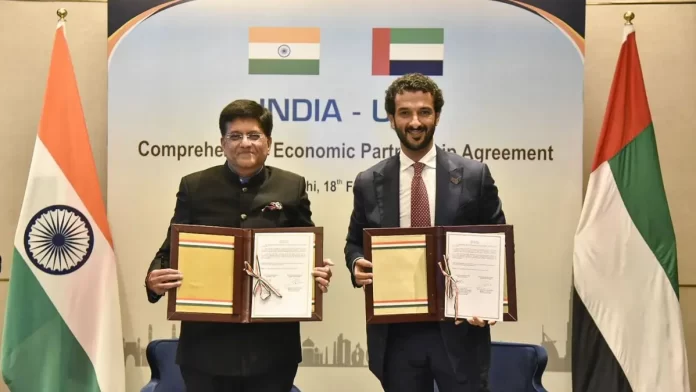India-UAE Comprehensive Economic Partnership Agreement (CEPA) is a landmark bilateral trade agreement between India and the United Arab Emirates.
It was signed on 18 February 2022 during a virtual summit between Indian Prime Minister Narendra Modi and Crown Prince of Abu Dhabi Sheikh Mohammed bin Zayed Al Nahyan.
The agreement assumes great significance as it is the first comprehensive trade agreement signed by India in a decade. It is also India’s first bilateral trade agreement in the Middle East and North Africa (MENA) region.
It is expected to bring in strong multiplier benefits to all stakeholders. Industry experts believe it will lead to an increase in bilateral trade from the current USD 60 bn to USD 100 bn in the next 5 years.
How CEPA Agreement will benefit India?
CEPA will provide significant benefits to Indian and UAE businesses, including enhanced market access and reduced tariffs.
According to Union Commerce Minister Piyush Goyal, around 90% of products exported from India to UAE will attract zero duty with the implementation of the Agreement by early May.
Terming the India-UAE Comprehensive Economic Partnership Agreement to be a landmark pact, he said that it will open up new markets for Indian goods and services.
“India-UAE Comprehensive Economic Partnership Agreement (CEPA) will be extremely beneficial for MSMEs, Start-ups, farmers, traders, and all sections of businesses”, he added while talking to media persons in Mumbai.
Speaking about the sectoral gains, he said the labor-intensive industries like Textiles, Gems and Jewellery, Leather goods and footwear and food processing industry would be prominent among those to benefit the most.
Shri Goyal asserted that the CEPA is a balanced, fair, comprehensive, and equitable partnership agreement, which will give enhanced market access for India in both goods and services.
CEPA and Job Creation
The Union Minister asserted that sector-wise consultations have shown that the pact will create a minimum of 10 lakh jobs for Indian citizens.
“It will create jobs for our youth, open new markets for our startups, make our businesses more competitive & boost our economy” he added.
Shri Goyal further informed that the CEPA which was finalized and signed in a record time of just 88 days, would come into force in less than 90 days, by early May.
He told the media that “around 90% of products exported from India to UAE will attract zero duty with the implementation of the Agreement.
80% lines of trade will attract zero duty, remaining 20% does not affect our exports much, so this is a win-win agreement.”
For the first time in a Trade agreement, the CEPA provides for automatic registration and marketing authorization of Indian generic medicines in 90 days, once they are approved in any of the developed countries. This will give big market access to Indian medicines.
Benefits to Indian Jewelry Exporters
Under the India-UAE Comprehensive Economic Partnership Agreement, Indian jewelry exporters will get duty-free access to the UAE, which currently imposes a 5% customs duty on such products.
This will substantially raise its jewelry exports since Indian-designed jewelry enjoys a great market reputation.
The Gems and Jewellery sector expects to increase its exports to US$ 10 billion by 2023.
Strategic Advantages to India
The CEPA will not only improve the competitiveness of Indian products but also provide strategic advantages to India.
Since the UAE functions as a trading hub, the Agreement will help provide India with market entry points to Africa, the Middle East, and Europe.
With the conclusion of the CEPA, India, and UAE aim to increase bilateral goods trade over the next five years to $100 billion.
For the unversed, UAE is India’s third-largest bilateral trading partner.
Similar Agreement with Gulf Cooperation Council
According to Union Minister Piyush Goyal, the Government is looking forward to concluding a similar economic partnership agreement with the Gulf Cooperation Council countries during this year itself.
He said the Secretary-General of the GCC has expressed the desire to fast-track the negotiations.
“We are also confident in our negotiating ability, we have conducted negotiations in a rapid manner with UAE, and we believe that a similar agreement on trade would be concluded with the GCC in this year itself,” he added.
GCC is a union of six countries in the Gulf region, namely, Saudi Arabia, UAE, Qatar, Kuwait, Oman, and Bahrain with a combined nominal GDP of US$ 1.6 trillion.
